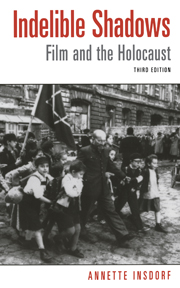Book contents
- Frontmatter
- Contents
- Foreword by Elie Wiesel
- Preface
- Introduction
- I Finding an Appropriate Language
- 1 The Hollywood Version of the Holocaust
- 2 Meaningful Montage
- 3 Styles of Tension
- 4 Black Humor
- II Narrative Strategies
- III Responses to Nazi Atrocity
- IV Shaping Reality
- V Third Edition Update
- Annotated Filmography (Third Edition)
- Filmography (Second Edition)
- Notes
- Bibliography (Second Edition)
- Bibliography (Third Edition)
- Relevant Websites
- Index
3 - Styles of Tension
Published online by Cambridge University Press: 14 January 2010
- Frontmatter
- Contents
- Foreword by Elie Wiesel
- Preface
- Introduction
- I Finding an Appropriate Language
- 1 The Hollywood Version of the Holocaust
- 2 Meaningful Montage
- 3 Styles of Tension
- 4 Black Humor
- II Narrative Strategies
- III Responses to Nazi Atrocity
- IV Shaping Reality
- V Third Edition Update
- Annotated Filmography (Third Edition)
- Filmography (Second Edition)
- Notes
- Bibliography (Second Edition)
- Bibliography (Third Edition)
- Relevant Websites
- Index
Summary
Montage is not the only way for a filmmaker to create tension; the Holocaust experience can be expressed or approached through disorienting camera angles and movement, heightened lighting, distorting visual texture or color, stylized acting, contrapuntal soundtrack ormusic, and unconventional narrative structure. Films as seemingly disparate as The Serpent's Egg, Cabaret, Kanal, Ambulance, Passenger, The Boxer and Death, Commissar, and Wherever You Are proceed via dislocation and discomfort, refusing to simplify or prettify painful reality through filters. They suggest that the shocking dimensions of the Holocaust demand stylistic devices of disturbance rather than complacency.
The Serpent's Egg (1977) is not a pleasing film. Ingmar Bergman's English language study of pre-Nazi Germany is morbid, depressing, and relentless in its tone of paranoia and inescapability. Through the relationship of an unemployed and alcoholic circus acrobat and a cabaret singer, the film presents three ominous aspects of 1923 Berlin: anti-Semitism; a ravaged economy; and scientific curiosity gone wild, severed from moral considerations. The serpent is an ancient animal; likewise, Nazism did not simply hatch: it was nurtured by historical antecedents, both economic and psychological. Beyond the story, however, Bergman weaves into The Serpent's Egg a troubled self-consciousness, questioning his own cinematic methods and purposes. By incorporating the films of a mad scientist within The Serpent's Egg, the director invites comparison between his images and those recorded by this chilling character.
Abel Rosenberg (David Carradine) is an American Jew – thus doubly an outsider in Berlin – who finds his brother Max dead in their hotel room. He informs Max's ex-wife, Manuela (Liv Ullmann), that Max shot his brains out. The singer, distraught and naïively generous, takes Abel into her apartment.
- Type
- Chapter
- Information
- Indelible ShadowsFilm and the Holocaust, pp. 43 - 58Publisher: Cambridge University PressPrint publication year: 2002



